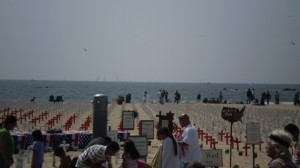Veterans Day: the Reality of Stories
At a wedding right after “The Hurt Locker” premiered, my husband Dan spoke with a family friend on leave from the military. This friend didn’t

understand why anyone would want to watch a movie like “The Hurt Locker,” why we would want to see that story on screen. Dan explained that we have no idea what daily life is in the military is like, and especially not those specific stories. That’s all it took for the family friend to understand. He never considered that we, artists in Los Angeles, might want to get a glimpse of understanding his work. I think it really hit him in a positive manner. Yesterday I saw La Razon Blindada, the production that transferred from 24th ST to Rubicon Theatre Company. I knew the basic premise: two political prisoners meet every Sunday at 3pm and cannot move from chairs or remove their hands from the table (true story). To sustain their sanity, their reason behind bars (thus the title, which translates to The Armored Reason), they tell each other stories. I’ve seen political theatre before and am very interested in telling true stories in ways that do not simply speak to those who understand the issue, but also give some sense of understanding to people who might never find themselves in these particular situations. I believe this leads to more tolerance in the world and better decision-making in societies. Watching a man slowly fall into madness onstage and how his friend pulls him out of this quicksand, while the world outside those walls collapses into chaos, that is a story I hope to never experience in reality. When the true life circumstances of the world were explained at
yesterday’s matinee, you could hear half the audience gasp at the possibility. The term “political prisoner” holds vague meanings to those without the experience. We may imagine recent images of prisoners with bags over their heads or being forced to speak knowing at any moment a gun could go off beside their brain. To these men in La Razon Blindada, all of their expression was taken away and only words and feelings left, literally, on the table. The first few times in the piece when the prisoners relaxed before hearing something off-stage and springing to their hands-on-table, sitting straight up posture with one word: “Careful!” - those times the audience understood something great was at stake. Short vignettes between scenes gave an idea of their life outside their stories, just a small wordless taste of the agony of being in solitary confinement, or the Hole. My own personal image of The Hole comes straight out of a movie: The Great Escape, and how it affects an Irishman who makes a desperate attempt for freedom after he’s been in The Hole one time too many. in the movie, this soldier feels overcome by an impromptu 4th of July celebration in the camp and runs with no plan, heeds nothing in his reality except for his own need for freedom. He ends up shot multiple times and pierced on the high gates standing between him and the prison camp. Sometimes stories of the psyche can affect audiences more towards empathy than images or numbers. The major exception that I experienced is the Vets for Peace Memorial at the Santa Monica Pier every Sunday. I happened upon it while touring the carnival festivities one day, as I believe is its power, and soon learned that every Sunday, volunteers meet before dawn to place a cross in the sand for every American killed in service. These are not numbers with multiple commas in a history book or blog; these people died last week. Families and friends are welcome to dress a cross to specify it is for their son, daughter, nephew, wife, husband, father, aunt........and I believe it is much more effective because people stumble upon this sight in the middle of joyful festivities. The first time it happened to me, I just stood on the bridge above in silence with my friend for five, maybe ten, maybe thirty minutes. Against the serenity of such a blue sky, in front of such a constant natural sight as the tide of the ocean, this cycle of death and destruction hits a person harder than a number, deeper than their gut. Perhaps a few people out of the 180 at the Rubicon yesterday experienced losing their mind or witnessed someone who cannot retain a grip on sanity, on reason, before watching the show. For the others, Chima and Tony portray a reality no one could wish upon their fellow man, but helps us see a different consequence to wars: political, personal or defensive.
---
Cindy is the Outreach/Marketing Director at 24th ST Theatre.

